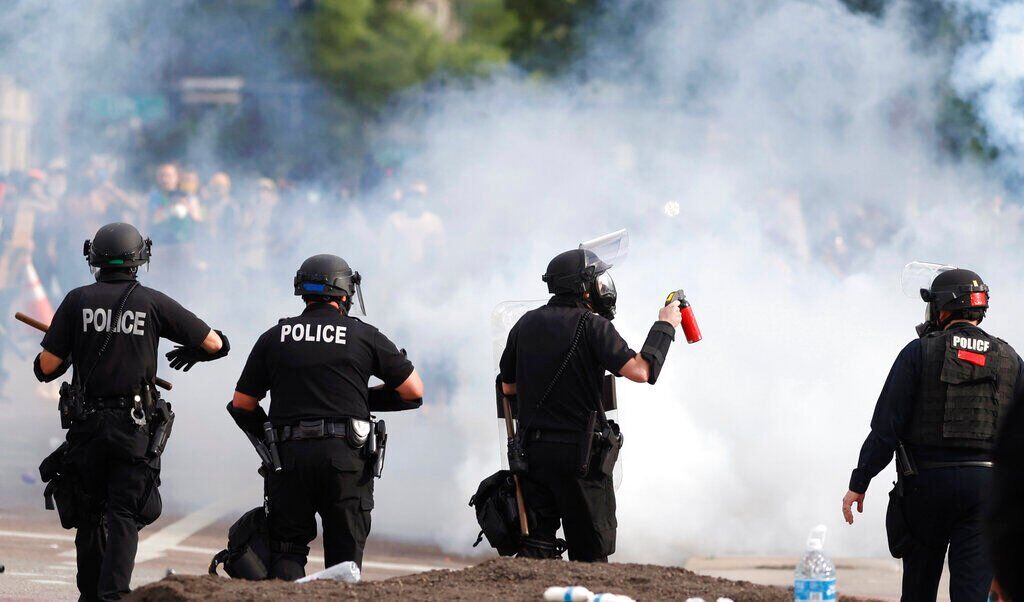Judge tosses lawsuit over military’s reprimand of officer in Black Lives Matter protest

After the Colorado National Guard walked back its discipline of an officer who protested for racial justice in Denver, a federal judge has dismissed the lawsuit on grounds that the underlying legal controversy has ended.
Alan Kennedy was a part-time Colorado Army National Guard captain in May 2020 when Minneapolis police murdered George Floyd, prompting international racial justice protests. Kennedy attended a Black Lives Matter demonstration in Denver and subsequently wrote an opinion article about his experience. National Guard officials then investigated and reprimanded Kennedy, based on an instruction from the U.S. Department of Defense prohibiting officers from participating in protests where “violence is likely.”
Although Kennedy alleged in his lawsuit the instruction violates the First Amendment and was unconstitutional as applied to him, U.S. District Court Judge William J. Martínez dismissed Kennedy’s complaint last week after determining the military had already processed Kennedy’s appeals and rescinded its prior discipline.
“(N)o order from this Court could have a real-world effect on Plaintiff’s rights,” Martínez wrote in an Aug. 8 order.
Kennedy characterized the Department of Defense instruction, or DoDI, as allowing the military to prohibit off-duty service members from participating in protests, even when the violence comes from the police themselves. The government countered that the Colorado Army National Guard misapplied the policy to Kennedy but, broadly speaking, the military has a valid goal in disciplining soldiers who attend violent demonstrations.
Following Floyd’s death, Kennedy joined protesters in Denver on May 30, 2020, during which police deployed teargas. Five days later, The Denver Post published a guest commentary from Kennedy describing his experience and saying the police’s response “made me sick, literally.” He identified himself as a captain in the Colorado Army National Guard, adding that the views he expressed were his own.
On June 18, an investigating officer issued a memorandum finding Kennedy had not engaged in “any political activities in violation of any Army regulations.” However, Col. Charles Beatty disagreed with that conclusion, noting the investigating officer had not considered the likelihood of violence at the protest.
“It is abundantly clear to me,” Beatty wrote to Kennedy, “that any reasonable person should have concluded that violence was likely to result at the protest you attended.”
In response to the inquiry, Kennedy authored another opinion article that ran in Colorado Newsline on July 9, asking why the National Guard was “investigating peaceful protests against systemic racism?” He described the military’s investigation into his conduct, alleged he was subject to “gag orders” and called the proceedings frivolous.
“None of these statements are true,” a superior officer wrote in issuing a reprimand for Kennedy’s second article. “Your misconduct calls into serious question your judgment and professionalism, as well as your basic loyalty to the values of the United States Army.”
In total, Kennedy alleged 10 punishments the military had meted out to him following his participation in the protest, including the denial of a promotion, a failure to act on his transfer request and the reprimands. A 2021 evaluation found him to have made disrespectful and false comments toward his chain of command in the Newsline article and displayed a “lack of loyalty.”
Kennedy filed his claims as a class action on behalf of all service members who faced similar discipline, and asked a judge to declare the DoDI unconstitutional.
However, in July 2021, the National Guard issued a memorandum clarifying the DoDI only applies to Guard members who are operating under federal command and control. Afterward, Laura L. Clellan, the leader of the Colorado National Guard, overturned investigators’ previous findings that Kennedy should not have attended the Black Lives Matter protest because he should have known it would turn violent.
“Because CPT Kennedy was not in federal active duty status at the relevant time, DoDI … did not apply to him. As a result, it was improper to investigate or reprimand CPT Kennedy,” she wrote on July 30, 2021.
Both sets of defendants, from the Department of Defense and the Colorado National Guard, moved to dismiss the lawsuit on the grounds that the military had rescinded or destroyed any discipline, and had cleared the way for Kennedy’s promotion and his transfer to the U.S. Army Reserves in Virginia. Although the defendants believed the reversals of Kennedy’s reprimands showed he should have waited to file his lawsuit until the military had finished its review, Kennedy argued the constitutionality of the National Guard’s actions and the First Amendment implications of the DoDI were still issues for a court to decide.
“Neither of these questions are within the scope of military professional expertise or the ability of internal military administrative appeals processes to answer,” his attorneys wrote.
The defendants responded that Kennedy had not shown they, specifically, would enforce the DoDI against him in the future, especially after the military’s clarification that the DoDI did not apply to Kennedy in May 2020. They also argued the military had an interest in disciplining soldiers who attend violent demonstrations.
“Plaintiff offers no valid reason why the military could not reprimand one of its soldiers for cheering on others to attack police at the Capitol Building on Jan. 6, 2021. But under Plaintiff’s theory, unless the soldier himself engaged in violence against the police, the military would be powerless to respond,” the U.S. Attorney’s Office and Colorado Attorney General’s Office explained.
Martínez, the judge, agreed Kennedy’s challenges to his since-rescinded discipline were moot. While Martínez assumed Kennedy had standing to challenge the constitutionality of the DoDI when he first filed his lawsuit, Kennedy’s transfer from the National Guard to the Army Reserves also mooted his claims against the Colorado National Guard leaders.
As for the federal military defendants, Martínez acknowledged Kennedy remained worried about possible investigations for his free-speech activities in the future. However, Kennedy’s lawsuit only described disciplinary actions taken against him erroneously by the Colorado National Guard, and not federal officials.
The “mere fact that the DoDI is still ‘on the books’ and applies to Plaintiff does not amount to an injury,” Martínez wrote.
Kennedy is now an instructor at the College of William & Mary. He campaigned in the Democratic primary for a Denver state Senate seat in 2018, ultimately losing to now-Sen. Julie Gonzales.
“I’m disappointed that it took a federal lawsuit to convince the military to respect my constitutional rights,” Kennedy told Colorado Politics.
The case is Kennedy v. Paul et al.











